
SUSTAINABILITY
Fira de Barcelona is strongly committed to sustainable development • protection of the environment • a circular economy • and the fight against climate change.
At Fira de Barcelona we have embraced the UN Sustainable Development Goals in the framework of the 2030 Agenda, adapting them to our strategy and expanding this commitment to our staff, events, exhibitors and visitors.
Aligning with the SDGs entails taking responsibility for such important issues as the quality of life, well-being and prosperity of present and future generations.
We establish guidelines, featured in our Sustainability Policy, aligned with our commitment to environmental, economic and social sustainability.
- 1 • ENERGY EFFICIENCY AND CONSUMPTION
- 2 • WASTE MANAGEMENT
- 3 • SUSTAINABLE FOOD & BEVERAGE
- 4 • SUSTAINABLE SERVICES
- 5 • SOCIAL COMMITMENT
- 6 • MOBILITY & ACCESSIBILITY
- 7 • AWARDS AND CERTIFICATIONS
- 8 • CHECKLIST
1

ENERGY EFFICIENCY AND CONSUMPTION
Venue energy efficiency is central to the Fira de Barcelona sustainability strategy. Aware of the value of resources, we focus part of our efforts on saving energy while using renewable energies efficiently and rationally by installing the most advanced technologies and equipment.
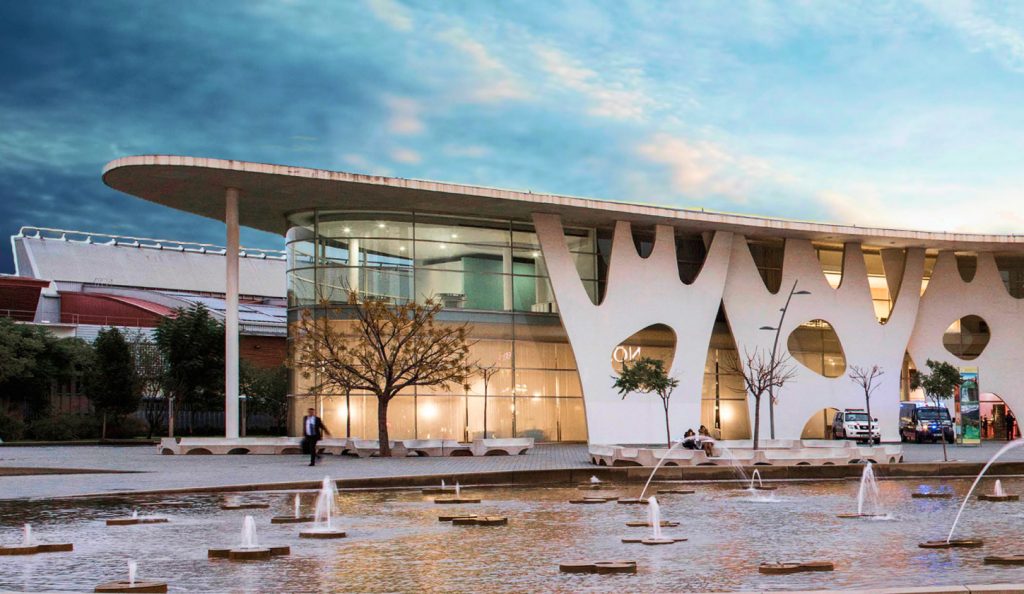
Power and reneweble energy
Fira de Barcelona facilities consume 100% green energy from renewable sources such as solar, wind, hydraulic, biomass, tidal, geothermal and biogas for all the consumption generated in the venues – stands, exhibition spaces and congress activities, as well as in all venue facilities. The source of 40% of this energy is produced in local wind farms, preventing losses on the electrical grid.
Fira Gran Via has 25,900 photovoltaic solar panels installed over 135,000 sqm of the venue roof generating 5.86 GWh of electricity/ year, eliminating a total of 2,200 tons of CO2 emissions per year.
Air conditioning
The Fira Gran Via venue is part of the South District Hrating and Cooling, a cutting-edge technology in efficient and sustainable air conditioning systems.
This system is based on the generation of hot and cold water in centralized plants that subsequently supply customers water through a network of pipes in an industry and/or service park. In the case of Gran Via, the water supply comes from three generation plants of biomass, regasification and trigeneration.
These plants also use green energy. Therefore, all energy as well as the water needed for the air-conditioning system are produced in a sustainable way.
Energy efficiency
At Fira de Barcelona we work to improve energy efficiency with equipment such as a low-consumption LED lighting and consumption control systems.
All venue utilities – electricity, water, gas and thermal energy – are monitored by BMS real that allows time energy management software that allows analysis and precise decision-making aimed at energy saving. The entire lighting system of the venue is controlled by the DEXMA/SCADA software 24/7.
Carbon footprint
Thanks to the sustainable initiatives implemented, Fira de Barcelona has reduced its CO2 footprint. The use of 100% renewable energy has eliminated the emission of 12,500 tons of CO2 per year.
Fira is also part of the Net Zero Carbon Events initiative, a global action driven by the events and meetings sector to address climate change and meet the goals of the Paris Agreement. Fira is a signatory institution of the pledge.
CO2 offsetting
We provide carbon footprint calculation services for organizers, exhibitors and attendees as well as offsetting platforms to compensate for greenhouse gas emissions by investing in climate-friendly projects such as reforestation, renewable energy or capture and combustion of methane.
We also provide for sustainability consulting organizers who would like to implement initiatives to improve their environmental performance.
Water
Water consumption has been reduced by installing waterless urinals and using groundwater for the outdoor water fountains at both the Fira Gran Via and Fira Montjuïc venues. We use self-closing washbasin faucets in most of our toilets.
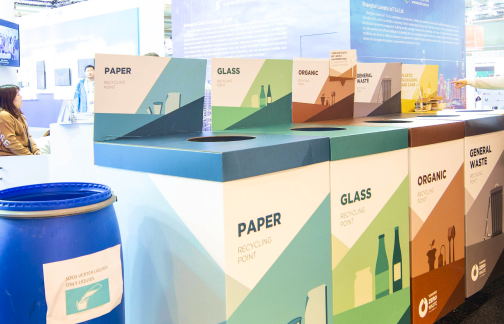
2

WASTE MANAGEMENT
The infrastructures that are needed for the staging of events are complex and challenging. One of the main questions is managing the large volume and diversity of waste generated during events.
Fira de Barcelona works to minimize this impact through initiatives following the circular economy criteria – reduce, repair, reuse, recover and recycle.
Green point & waste reports
The venue has a fixed green point to optimize waste collection with duly trained personnel to manage this space. We have different waste streams such as glass, oil, cardboard, wood and organic waste and on-site paper- cardboard compacters.
We have mobile scales that allow exhaustive monitoring of waste generation.
We provide post-event waste reports of the total tonnes of waste generated per day and per waste stream.
Waste patrols and exhibition skips
We encourage establishing control patrols within the halls to follow up the waste generation during build-up and tear-down, to ensure that contractors separate waste – paper and cardboard, glass, packaging, etc.
During build-up and tear-down skips can be ordered for wood, plastic and general waste.
Sustainable cleaning
In the cleaning field, we use recycled plastic in garbage bags, cleaning products in large containers (in bulk) and eliminate plastic in the packaging of supplier consumables (GV).
The use of 100% eco-friendly products and non-polluting or non-environmentally harmful products is prioritized. All Fira de Barcelona toilets use paper with a fast disintegration time.
Recycling bins
We can offer recycling bins with different colours for segregation in halls, offices and restaurants and catering spaces.
In addition, large containers and covers for organic or glass waste can also be ordered and managed.
Donation room
We encourage sustainable alternatives such as donation rooms and the rational use of resources by suppliers and builders for waste that cannot be recovered.
We plan the circuit of materials used, both in the construction of stands or common areas, as well as in consumables, promotional materials or packaging and catering.
Towards zero waste
In events organised by Fira de Barcelona we collaborate with the ‘Towards Zero Waste’ project, promoted by Barcelona City Council, which implements various initiatives to reduce waste at events and increase the efficiency in resource management (glass recycling, free public transport passes, food donation, leftover material donations …).
8.000
tonnes of WASTE
It is the volume we transfer annually for recovery.
3

SUSTAINABLE FOOD & BEVERAGE
The Fira de Bacelona inhouse Food & Beverage department – Gastrofira is committed to promoting sustainable practices and implementing the targets set within the SDGs, strengthening the links between food, people and the planet.
We have launched various initiatives to reduce food waste, develop programmes for precise food production and reduce the use of single-use plastics, amongst many other actions.
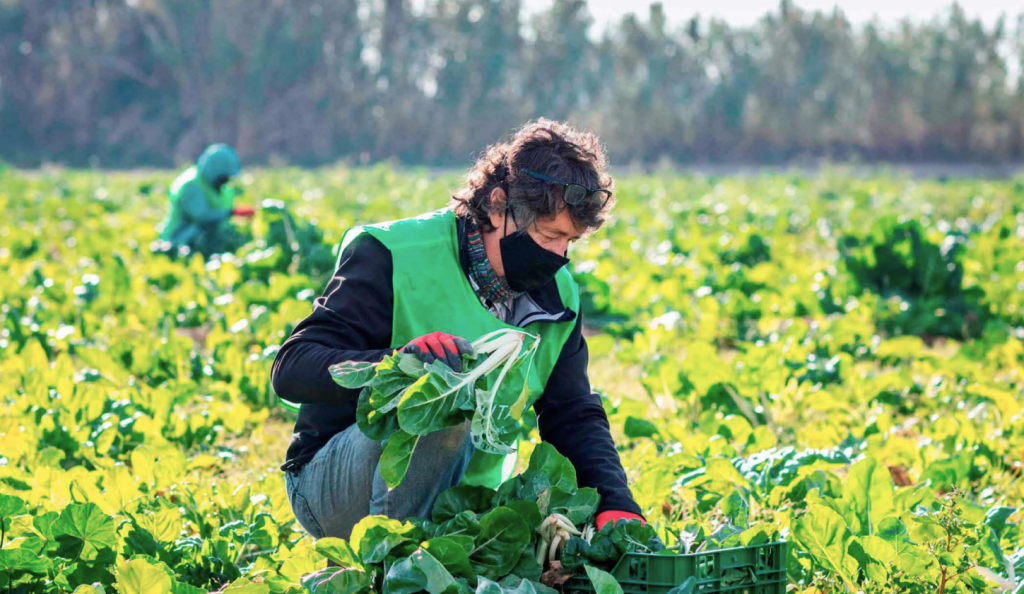
Towards plastic reduction
Gastrofira has implemented a strategy to reduce single-use plastic in all catering production and outlets by providing reusable ware, increasing the use of compostable and recyclable material, introducing bioplastic materials (PLA) and discarding disposable ones.
We also replace aluminium cans or PET bottles with glass bottles and discard milk plastic or Tetra Brik bottles. We collect all coffee capsules at the end of events and separate them from the rest of the waste.
We encourage the use of water fountains and osmosis tap water to avoid the use of plastic bottles.
Donation of food surplus
Gastrofira regularly donates healthy food surpluses to people at risk of exclusion through the “Barcelona shares food” programme in cooperation with the NGO Nutrition without Borders. We help organizers create an offer to meet our sustainability goals and reducing food waste.
We also provide new unused food service materials (plates, cutlery, tables, etc.) to social entities (such as the Red Cross, among others) through the Barcelona City Council, or use the recycling of vegetable oils for social purposes (Rastro Solidario).
Local suppliers & sustainable menus
In order to reduce CO2 produced by transport, Gastrofira has the commitment to collaborate with local suppliers and producers for a 60% of the items purchased for food production and to offer locally sourced produce. In addition, Gastrofira requires our partners and suppliers to follow sustainable policies.
We also adapt menus to seasonable products and work jointly with organizers towards creating more sustainable and healthier food choices for their events.
Imperfect fruits and vegetables
We also collaborate with Fundació Espigoladors, an NGO that fights against food waste and losses, giving a second opportunity to ugly and imperfect fruits and vegetables. It empowers people at risk of social exclusion in a transformative, participative, inclusive and sustainable way.
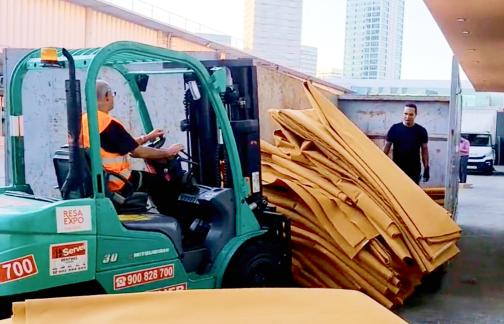
4

SUSTAINABLE SERVICES
Fira’s commitment to sustainability extends to the entire supply network and production chain for events. We work with local suppliers to reduce the carbon footprint and foster local economy.
Sustainable supply chain
We include environmentally preferable criteria when selecting all our suppliers. Specifications include environmental, labour and social criteria – ranging from certification requirements (ISO, EcoVadis, Biosphere, LEEDS, IQNet…), CSR and gender equality/inclusive policies, annual sustainability reports to sustainable production materials, plastic reduction, energy efficiency and waste management, amongst many others.
The process toward green purchasing aims at promoting a better selection of products and services that make more efficient use of resources, promote innovation and improve the environmental, labour and social performance of the supply chain, both upstream and downstream.
Local suppliers
We partner with local suppliers with nearby offices and warehouses, which reduces the carbon footprint in transportation and supports suppliers in their commitment to reduce the impact of their activities.
Promoting paperless actions
Fira de Barcelona contractor registration is digital and paperless and can be added to phone wallets in mobile devices.
Sustainable projects
We can work from the design and conceptualization to production and end-of-life management, prioritizing the circularity of projects and product life-analysis, in order to minimize the environmental impact of the project.
In addition, materials with ecolabels, that contain recycled and/or easily recyclable materials, such as, for example, wood with FSC and/or PEFC label, recycled aluminium, textiles/canvas produced with recycled materials, cork, rubber, cardboard, etc. can also be used under request.
Stand construction service
We offer the possibility of using sustainable stands that include energy efficiency measures, recycling, eco-design and optimization of services to minimize the environmental impact of trade fair activity.
Use of recycled carpet
All carpet installed by Fira de Barcelona is recyclable, and we encourage events to recycle it fostering in this way the implementation of a circular economy.
Sustainable signage alternatives
We offer sustainable and innovative material alternatives for most elements in our signage catalogue. Moreover, in our requests for tender, we add sustainability criteria and values that count towards the final evaluation of suppliers:
– Have the Green Guard certification or equivalent that certifies the use of sustainable or natural inks, avoiding dangerous volatile organic compounds.
– Offer more sustainable materials such as polypropylene board with algae-based filling, bamboo board, fibre board from agricultural waste or hemp fabrics (reducing materials with a negative environmental impact).
– Use recycled PET or sustainable material in containers and/or packaging.
– Waste management certificate or follow-up plans ensuring quality and its final destination.
– Have an environmental management system certified according to ISO 14001 standards, and environmental management systems such as EMAS or equivalent.
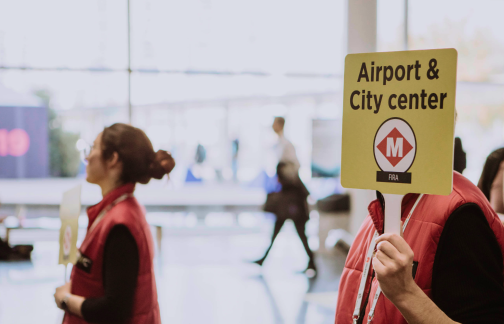
6

MOBILITY & ACCESSIBILITY
Fira de Barelona encourages exhibitors and visitors to travel by public transport, on foot or by bicycle during their stay in Barcelona, or in the event they need a vehicle, to choose one that is non-polluting.
The Fira Gran Via venue is a completely accessible and obstacle-free space that guarantees the full participation of all attendees. All car parks have special spaces reserved for people with disabilities.
Public transport
Fira de Barcelona is well connected to the public transport network of the metropolitan area thanks to the numerous bus, underground and railway stops near the various venues. The underground also connects the venue to the airport. In addition, permanent shared bicycle parking has been located near the venue.
Promoting the electric vehicle
The venue has 18 charging facilities for visitors and 12 for suppliers.
Promoting bicycle use
We foster the use of personal mobility vehicles and bicycles. Our venues have access to bike lanes and a free guarded bicycle park is offered in some events.
Promoting sustainable transport for staff
The Fira Montjuïc venue has a parking area for bicycles and scooters. The space also includes 12 lockers. The car park located on Carrer Lleida also has 10 additional bicycle parking units.
Accessibility
Access from both public transport and the different floors is by a lift with automatic doors. The the lift control panels are located at an accessible height (between 850-1100 mm) and have Braille writing for visually impaired attendees. The intercom function is available via the alarm button. As for the spaces, all the corridors and aisles have a minimum free width sufficient to guarantee easy movement and the stairs are equipped with safety railings.
All toilets in the venue have at least one cabin adapted for wheelchair use, with a minimum width of 1200mm, grab rails and low sink.
All our front desk counters are also adapted with one position at a height of 80cm.
We have wheelchairs available for all attendees and also offer scooters for rental
Accessible design of temporary spaces
In our space regulations we always reserve spaces for wheelchairs and scooters in the congress halls and session rooms.
Navilens
The Fira Gran Via venue is fully equipped with NaviLens smart codes (tags).
NaviLens improves the accessibility of the visually impaired and makes the venue a more inclusive space. The venue signage and information is available in more than 36 languages using a mobile application which detects the tags from long distances with no need to focus on the tag
7

AWARDS AND CERTIFICATIONS
In 2021 Fira de Barcelona was issued the ISO 14001 for its Environmental Management System.
The certification sets the requirements for an environmental management system (plan, policy, review and corrective actions) to enhance the environmental performance of organizations and partners and contributes to the following Sustainable Development Goals:


Fira de Barcelona signed the Net Zero Carbon Events Pledge in 2021. Connected to programmes like the United Nations Sustainable Development Goals (UNSDGs), the initiative seeks to drive a global action for the events sector to address climate change and meet the goals of the Paris Agreement.

In 2021 Fira de Barcelona was awarded the UFI Operations & Services Award 2021, recognizing the initiatives implemented by Fira de Barcelona in collaboration with different local entities to respond to the context of the pandemic and relaunching events by providing value in a post-COVID environment – with the installation of equipment such as a mass vaccination point or a temporary hospital.

In 2019 Fira de Barcelona signed the Barcelona Biosphere Tourism Sustainability Commitment, which aims at making the city a sustainable destination, extending best practices to all types of tourist services, products and equipment companies. It recognizes companies that are committed to responsible management that respects the environment, culture, working conditions, gender equality and their social and economic contribution.

In 2017 Fira de Barcelona was awarded the UFI Sustainable Development Award. for the ‘Best destination approach to implementing sustainability’. The award recognizes the initiatives that combine the efforts of a destination, in partnership with a professional exhibition operator, to implement sustainability around an individual exhibition or a series of events, recognizing measures such as energy efficiency, eco-design, waste management, CSR programme, paperless processes, free consultancy and donation rooms.

Fira de Barcelona was awarded the AIPC Innovation Award in 2013 for the development of a Near Field Communication (NFC) Badge, applied for the first time in a venue during the Mobile World Congress 2013. This innovative technology allows a faster and more secure access to the venue and eliminates the need of any badge material.
8

CHECKLIST
With the following checklist we intend to help organizers understand the scope and actions of sustainability during their event.
PLANNING & COMMUNICATIONS
✓ Set the sustainability objectives for the event and work with our Fira teams to meet these targets,
✓ Keep in mind the 8 R’s: Reduce, Replace, Reuse, Recycle, Recover, Refuse, Reject, Rethink,
✓ Use social media to promote the sustainable initiatives prior to the event and achievements from the event,
MERCHANDISE, SIGNAGE & PRINTING
✓ Use electronic, plastic-free and paperless alternatives: digital badges, digital flyers, digital signage
✓ Explore event signage and branding sustainable options with our Fira teams (using PVC-free items, vegetable-based inks, etc.)
✓ Reduce or avoid printing promotional materials
✓ Produce responsible merchandising with a positive impact (local, fair trade or part of a social project, made from sustainable materials, plastic-free…), if using any
✓ Build feature areas or booths with sustainable, certified and reusable materials fostering a circular economy
FOOD & BEVERAGE
✓ Provide sustainable food choices with seasonable and local products
✓ Check all available catering options for accessories – bulk, reusable and compostable cutlery, crockery and silver ware – avoiding plastic single- use items
✓ Offer water fountains across the venue and refillable bottles
✓ Work on accurate numbers for catering in order to avoid food waste
✓ Follow up with excess food donations and collaboration with local NGOs
LOGISTICS
✓ Encourage the reduction of lorries and vehicles going onsite
✓ Optimize shipment load and packaging – i.e. reduce the size by decreasing the necessary filling and strapping, and make an appropriate estimate of the goods required
✓ Prioritize packaging that can be reused for incoming and outgoing goods
✓ Promote the use of alternative fuel vehicles whenever possible (gas, hybrid, electric…)
✓ Avoid the use of plastic packaging and use less polluting materials (cardboard, textile, wood, etc. that are reusable, recyclable or contain recycled and/or certified components (FSC, PEFC…)
TRAVEL & CARBON OFFSETTING
✓ Promote hotels that ensure sustainability and offer sustainable forms of mobility (transfers in electric vehicles, bicycle rental, etc.)
✓ Promote environmentally friendly means of transport such as public transport, walking and carpooling. Fira de Barcelona is connected by underground, rail and bus
✓ Offer visitors the option to offset their travel
✓ Calculate your event CO2 footprint and offset it by investing in environmental projects
ENERGY
✓ Ask the venue and or exhibitors to shut down power overnight to reduce consumption
✓ Request the use of LED lights in all booth construction
✓ Turn off equipment and lights when not in use
✓ Establish minimum and maximum temperatures for heating and cooling in order to minimize energy consumption
WASTE MANAGEMENT
✓ Draft a waste management plan with our Fira teams, identifying the required waste streams
✓ Use the recycling bins offered by Fira de Barcelona
✓ Reinforce signage to help identify proper waste separation, encouraging the event reuse and recycling policies
✓ Reuse or donate leftover materials. Please check the different initiatives at Fira to give the leftover materials a second life
✓ Hire control patrols for exhibitions to ensure that contractors segregate waste and use recycling skips properly
✓ Recycle all roll carpet at the event or rent carpet tiles
✓ Recycle lanyards, satchels and bottles to be repurposed
✓ Prioritize rental furniture and decoration elements instead of purchasing single-use items
✓ Ask for your waste management report and analyse the indicators
5
SOCIAL COMMITMENT
Fira de Barcelona promotes a culture of cooperation and solidarity among the entire workforce and works together with institutions, organizations and social entities to develop projects that contribute to building better societies and supporting local communities.
70
tonnes of cooked
Since 2012, Nutrició sense fronteres has delivered 70 tonnes of cooked food to 15 social entities.
Gastrofira collaborations
Gastrofira supports initiatives and local community partnerships that help young people gain the employability, skills and confidence they need to succeed. We collaborate with various entities in the social sector with the aim of promoting work for people at risk of exclusion, diversity and interculturality:
– Cuina Justa
This programme promotes and encourages social inclusion and employment of people with disabilities.
Cuina Justa believes that the best way to integrate those who have more difficulties is by offering a job that is justified by its efficiency and economic rationality, which results in a product with a high level of commitment and quality. Therefore, this is a social and solidarity project, helping people construct an identity as a worker and citizen, combining the economic and social purposes.
– Melting Pot
This programme promotes intercultural relations and the recognition of diversity through the food and talent of our chefs. We encourage new opportunities and support the talents of migrant entrepreneurs.
Staff volunteering
Fira de Barcelona staff have collaborated with entities such as the Food Bank, Fundacio Exit (against school dropout through innovative educational programmes), Caritas, the San Juan de Dios Foundation and the United Nations High Commissioner for Refugees (UNHCR).
Covid pandemic
Fira de Barcelona was awarded the UFI Operations & Services Award 2021 in recognition of its versatility in the face of the crisis arising from COVID-19.
With this award, the UFI recognizes the initiatives implemented by Fira de Barcelona in collaboration with different local entities to respond to the context of the pandemic and to restore activity with two objectives: promoting the holding of short-term events and establishing solutions to future challenges by providing value in a post-COVID environment (by installing facilities such as a mass vaccination point or a temporary hospital).